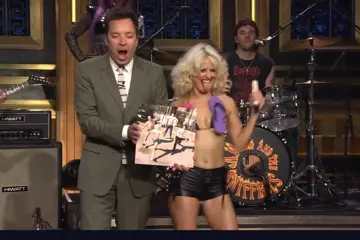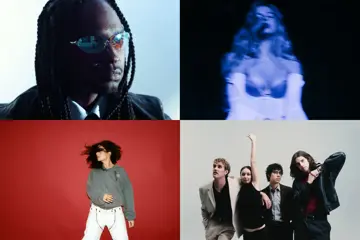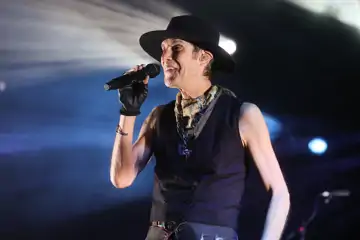CREED

The best moments in Creed aren’t all the times where it taps into franchise lore, when writer/director Ryan Coogler — flogging a dead-horse IP with unexpected élan — raids the previous six Rocky films for everything from trivia to winking jokes to tortured back-story. Instead, they’re in two contrary examples of Coogler as director, in elements of the film that have nothing to do with the same-ol’ sports-movie tale that sits at its centre: Michael B. Jordan as self-made boxer, punching above his weight thanks to training guidance from tired, old, broken Sylvester Stallone.
Coogler comes to Creed from making Fruitvale Station, a work of cine-activism that, with righteous indignation and sad, troubled heart, recounted a real-life killing, another instance of police brutality and black male persecution. Aside from its searing topicality, Fruitvale Station was notable for inhabiting a real world of Oakland streets and BART stations, life teeming around the production. Coogler carries this into Creed, employing non-professionals for the rank-and-file cast, and allowing elements of unvarnished realism to creep into his sweeping crowdpleaser. Down-and-out Philadelphia —that seat of Rocky lore— presses in on the frame; the rough-and-tumble streets no mere backdrop, but living eco-system.
But Coogler also shows a sense of directorial ambition in Creed, and an unexpected playfulness with sports-movie clichés. His Boxer Profile freeze-frames — turning even minor pugilists into trading-card heroes with nicknames/records intertitled on screen — are genuinely fun, and all the endless montages (even Rocky had a montage!) are brought to life with inventive visuals, sharp editing, and stirring songs. The best of these comes when Jordan, in more Rocky homage, does his own run through the Streets Of Philadelphia, whilst a crew of bros on souped-up motorbikes pop monos beside him; Coogler capturing this in ultra-slow-motion that is at once myth-makin’ and hilarious.
Later, there’s a great, Scorsese-esque one-shot sequence in which Jordan — at his climactic fight with Tony Bellew’s swaggering ‘Pretty’ Ricky Conlan — heads from his training-room in the bowels of a stadium, through its dark catacombs, and out into the arena; bathed suddenly in light, noise, and the gravity of the situation, his journey from obscurity to the big-time symbolised in a single take.
Whilst Coogan impresses as director, he also does good work as a writer; moving away from cliché and not forcing sentimentality. Jordan’s telegraphed love-interest, Tessa Thompson (so great in Dear White People), is allowed to be an individual character; a songwriter who makes Twigs-ish art-R&B (with Moses Sumney in her band!), whilst battling a degenerative hearing condition. Stallone, his action-hero bluster shelved, is an old-man: a lifetime of loss and regret trailing out behind him; his performance carrying the weight of the actor’s own history. Evocations of Jordan’s debt to his dead father — Carl Weathers in the original Rocky films — are given due complexity; this film, as much as anything, about family, heritage, baggage.
Eventually, the big fight turns Personal, and boxing becomes a metaphor for life. Jordan’s fight in the ring is paralleled by any number of other fights: against time or disease; to make your own story and be your own man. After the reprehensible Southpaw, which dumped a truckload of unearned pathos onto an essentially-offensive premise, Creed’s marriage of sporting heroism and triumphant emotion seems dignified, in comparison. And, in doing so, Coogler artfully reanimates a dead franchise, bringing Rocky back to life in unexpectedly-impressive fashion.
THE PROGRAM

Where the Rocky franchise, and sports-movies in general, give rise to the idea of sporting success revealing the mettle of men, Stephen Frears’ The Program treats the idea with due scepticism. It’s a portrait of the career of Lance Armstrong, seven-time Tour de France champion, inspirational cancer-survivor, and methodical blood-doper.
Ben Foster loses weight and eyebrows to play the fallen champ, and Frears’ film mixes and matches cut-ins with real TV coverage of old races; Phil Liggett, forever the ‘voice of cycling’, become a pseudo-narrator through his on-the-ground/back-in-the-day commentary. Old Liggett speeches about Armstrong being one of the good guys — a clean cyclist in a sport rocked by controversy — now get play with due irony. And irony is, essentially, The Program’s currency.
For much of its run-time, the film plays as hoodwinking comedy. Sometimes, that comedy borders on zany — Armstrong and fellow cyclists nervously acquiring EPO in a Swiss pharmacy like teens buying condoms; a montage of awkward corporate endorsements silly in its juxtaposition — but, mostly, the film recounts Armstrong’s gaming-the-system with a wry smirk.
This includes those moments — the film’s most incisive, and ultimately most indicting — when Armstrong acts with mock honour, telling any investigating officials they “should do whatever [they] think is best for the integrity of cycling”; his self-appointed virtue giving him a haughtiness, as if he is above reproach, beyond suspicion. “I have never tested positive to performance enhancing drugs,” he repeats; be it practicing in the mirror, in ‘candid’ sit-down interviews, or at defiant press-conferences.
As investigators circle, drawing ever closer — his empirical reign teetering — Foster buys cycling’s governing body a blood-testing machine, thereby buying political clout and symbolic goodwill. Like a mafia heavy, he greases the right palms, leans on other people, and keeps close his co-conspirators (like Jesse Plemons, duelling with Alicia Vikander for #1 figure of cinematic omnipresence this year). When David Walsh’s book — on which the film is based — comes out within the narrative of the film, Foster goes on a Scorsese-esque rant about crushing all who oppose him (“I’m Lance Armstrong!”), finally, dramatically transformed from mere doper to drug kingpin.
TRUTH

Truth sounds like a banal name for a film, but in James Vanderbilt’s piece of prime Oscarbait, the very notion of truth is the central theme, its dramatic engine, and a repeated verbal hook. “Tell me the truth, the whole truth,” Robert Redford intones, playing iconic US news-anchor Dan Rather, anchored at the heart of a scandal symbolising the nadir of W. Bush-era America; a media milieu in which to dare question the bellicose foreign-policy and war-mongering Middle Eastern invasions was tantamount to treason. “Am I or have I ever been a liberal?” Cate Blanchett mocks, when on ‘trial’ for the great crime of digging up Dubya’s old military records; Patriot Act hysteria connected, duly, back to McCarthyist witch-hunting.
Truth’s true story depicts the blowback against a 60 Minutes special that uncovered young George's days as coke-lovin’ deserter. Blanchett's plays Rather’s swaggering, sassy, smarth-mouth’d producer, Mary Mapes. A Brockovichian go-getter who recruits a rag-tag crew of crack investigators (muckraker Topher Grace, managerial Elisabeth Moss, wizened Dennis Quaid) via a getting-the-band-together montage, she sets her team on the case, like bloodhounds fed a scent of scandal.
Initially, Truth plays as affectionate portrait of old-fashioned sleuthwork, but once the story is ‘broken’, and their methods are called into question, it tilts dramatically on its axis. Working from Mapes’ memoir Truth And Duty: The Press, The President And The Privilege Of Power, it’s filled with attendant rage; its author still smouldering over the messenger-shooting and scapegoating that went down, the incident obliterating her once-glittering-career.
Adapting it to screen, Vanderbilt pens a host of big speeches: Grace railing against top-down corporate policy and political alliances (CBS parent co. Viacom getting named and shamed); Redford delivering a solemn, dignified dissertation on the demise of news (which was, once, he laments, a “public trust”); and, finally, Blanchett remaining defiant when brought before her kangaroo court. It’s not subtle, but there’s genuine ire and fire to its righteousness; Truth mounting a damning depiction of the state of journalism in a time of interest-managing media conglomerates.
SECRET IN THEIR EYES

Secret In Their Eyes isn’t just seasonal Prestige-Picture fodder, but Oscarbait that comes already vetted. It marks the American remake of Juan José Campanella’s 2009 Argentine thriller, a film that won itself a Best Foreign Language Film Oscar in 2010. Billy Ray, who last bothered the Academy with the screenplay for Captain Phillips, brings the film to American shores; the ‘past’ portion of its dual-timeframe narratives no longer Dirty War Buenos Aires, but post-9/11 Los Angeles.
Ray ditches the framing ‘old cop writing his memoirs’ device, and makes the This-Time-It’s-Personal murder case even more personal: obsessive sleuth Chiwetel Ejiofor and sexy department boss Nicole Kidman are still entangled in sidelined case, out to put things right for a tortured, grieving mother. Only, this time, it’s Julia Roberts, who happens to be their partner on the force.
Otherwise, the film’s big set-pieces remain: the scene where Kidman uses her lady wiles to entrap the young perp; the twist ending which, well, um, yeah, don’t hold out great hopes; and, of course, the chase sequence through the stadium at a sports match. The original’s showstoppin’, unbroken single shot through Estadio Perón becomes, here, a journey through Dodger Stadium; visual splendour enlivening one of those familiar crime-thriller clichés where the Killer is so close-by the sleuth can smell him.
As with the original, the writing is too tangled up in genre cliché to take it seriously, and the finished package doesn’t seem likely to get swept up in the Awards Show season. But Secret In Their Eyes is fabulously acted. Roberts’ voyage from wise-crackin’ to heartbroken to ashen-faced to virtuous allows her great scope and range, the starlet rarely coasting on her familiar charm and smile.
But it’s Ejiofor — whose whispery turn in Craig Zobel’s Z For Zachariah is already one of the year’s most overlooked performances — who does the best work, displaying, again, the subtle mastery of his craft. He may not get any screaming-over-the-dead-body-of-his-daughter moments, but Ejiofor conveys so much through mere gesture or look. And is easily the best thing in this so-so film.















